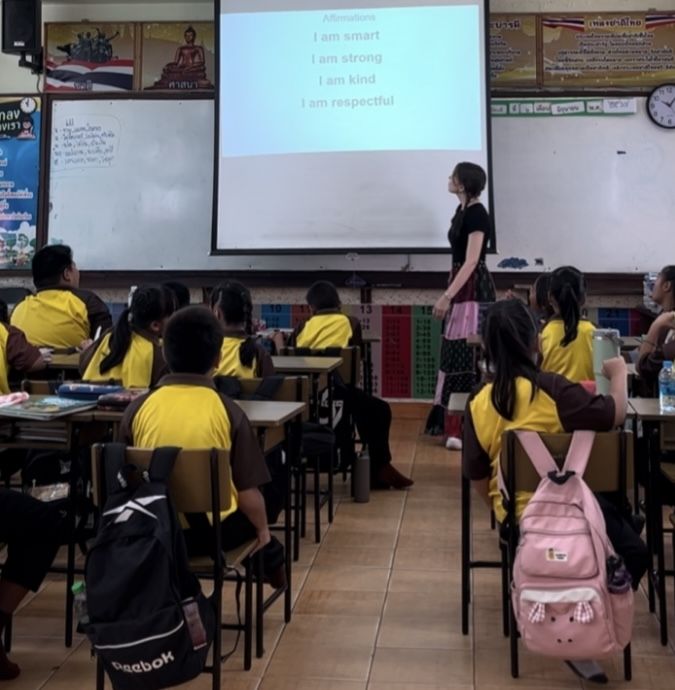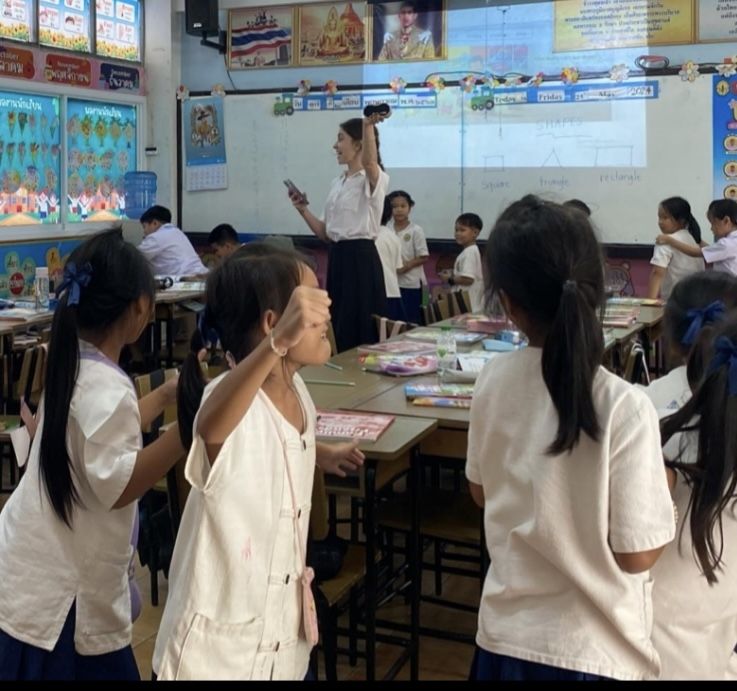Why I’m Choosing to Get TEFL Certified After Teaching a Semester in Thailand
Why I Started Teaching Without a TEFL Certification
When I decided to teach English in Thailand in the Spring of 2024, I was looking for a new adventure and a way to travel in Asia. I had backpacked in Thailand for a month and wanted to learn more about the culture by living there. I didn’t have a teaching degree or any certifications. The only experience I had was teaching yoga in an Elementary School in South Carolina for a year. That job allowed me to become more comfortable working with children, creating lesson plans, and managing a classroom of up to 25 students.
Teaching grammar, vocabulary, and phonics required a different skill set than I had used to teach yoga. Plus the language barrier and new culture added another layer of complexity. It was a completely new kind of challenge for me explaining grammar rules and concepts in simple terms for kids to understand. My Thai students also had varying levels of English proficiency, which meant I had to constantly adjust my teaching styles and lessons to accommodate all learners in large classes of up to 31 students. Facing these challenges taught me a lot, but they also showed me the value of formal training- not only for strengthening my teaching skills and tools but also for expanding my opportunities to teach abroad or online in the future. My prior experience gave me a head start in Thailand, but TEFL training would have made my transition smoother and provided me with a stronger foundation as a teacher.
Four Reasons Why I’m Pursuing a TEFL Certification Now
CIEE’s Teach in Thailand program doesn’t require a TEFL certification, which is why I initially jumped into the experience without one. After a semester of teaching in Thailand, I’ve decided to invest in a TEFL certification for these four reasons.
1. To Enhance My Skills as an Educator
Ultimately, my goal is to give my students the greatest learning experience. My teaching instincts have improved, but I want to deepen my understanding of how to teach. I also want to better support my students’ linguistic and academic growth, so I see it as an opportunity to refine my skills and become a more versatile teacher.
2. To Expand my Career Opportunities
While Thailand doesn’t require a TEFL certification, other countries and online teaching platforms do. I want to keep my options open and have more opportunities, whether that means teaching in another part of the world or working remotely as an online teacher. In addition to that, I want a competitive advantage and to secure the best position. Most countries that do require a TEFL certification ask for at least 120 hours, so choosing the 150 or 180 hour course through CIEE will give an even greater advantage over other applicants.
3. To Increase My Earning Potential
Having a TEFL Certification means earning a higher salary. Employers view certified teachers as more qualified and are willing to offer better pay. For example, schools in Thailand that partner with CIEE/OEG provide up to 43,000 baht per month for teachers with prior experience, degrees, or certifications vs the base pay of 30,000 baht per month with no experience.
4. To Explore Free TEFL Job Placement Opportunities
The benefit of acquiring your TEFL certification with CIEE is the free job placement assistance they offer in incredible destinations like Spain, Chile, Hungary, Japan, and Morocco. They also offer job coaching and online resources to help you search for jobs online or in other destinations worldwide that are in need of English teachers. . Having one-on-one job coaching and using a well established company like CIEE opens doors to reputable schools all over the world. CIEE provides amazing post- certification support making it unmatched in terms of resources and opportunities.

Reflecting on My Semester in Thailand
Teaching in Thailand has been one of the most rewarding experiences and I created memories that will last a lifetime. My kids' boundless energy, curiosity, and kindness inspired me daily, and their excitement to learn reminded me to approach life with joy and enthusiasm. From teaching grades 1-3, with kids aged 6-9, I learned patience, adaptability, and the beauty of connecting across language barriers. The kids were bright, creative, and competitive, because school systems push children to excel academically and learning English is extremely important. Some of my students were wild, some were reserved, but they all were loving and appreciative of me being there trying my best each day. My students and co- teachers taught me to celebrate small victories and embrace cultural differences with an open heart.
In the beginning, there were moments of frustration where I felt very overwhelmed and unsure. I was shocked to be expected to go into teaching the first day I arrived at my school. I learned through trial and error what worked and what didn’t work and also how unpredictable it can be teaching in Thailand. They see time polychronically so plans change and time is flexible. After the first month, I understood how to be adaptable and what my students' learning styles were. I had to be three completely different teachers to support my students' needs. My third graders were the most difficult for me; They tested my patience and strength like nothing I have ever experienced. They were rambunctious, loud, and full of energy.
My favorite part of my teaching experience was watching my first grade beginner level students learn English for the first time. Most of them came into the school year knowing nothing but “Hello”. A lot of them didn’t even know how to say “My name is xyz”. It was challenging and intimidating when I was starting off, but their motivation and enthusiasm to learn was huge. I got the privilege to watch their development and confidence in English speaking and writing increase day by day, lesson by lesson because of my teaching. Seeing them light up as I walked into the classroom or the love notes they wrote to me saying that I’m their favorite teacher are the moments that reminded me how much I love my job and can see it being a career.
Navigating the semester made me a stronger teacher, but I realized how much easier it could have been with formal training. As I’ve started my certification, I feel a mix of excitement and determination. Teaching in Thailand for 6 months has been an incredible chapter of my life, and I’m eager to build on what I’ve learned by going back or exploring other teaching placements.
To Anyone Thinking About Getting TEFL Certified and Teaching Abroad
To anyone considering teaching English abroad, don’t hesitate. It’s an experience that will challenge and inspire you in ways you can’t imagine, helping you develop both personally and professionally which is something that a traditional career path won’t. You get a unique opportunity to immerse yourself in a new culture, gain global perspectives, build connections with people from diverse backgrounds, and learn new languages. You’ll boost your personal and professional growth by navigating unfamiliar environments and adapting to new educational systems. You’ll gain skills in adaptability, reliance, and problem solving. If you can, I recommend you take the time to get TEFL certified. It’s an investment in your future and in the lives of the students you’ll be teaching.
A TEFL certification is valid worldwide and never expires. CIEE’s 150-Hour TEFL Certificate course is designed to prepare teachers not only to teach English but also to thrive in diverse environments by focusing on classroom management, lesson planning, and adapting to different learning styles. The curriculum combines practical training with a deep understanding of cultural competency. Plus, if you’re new to teaching, it will give you the skills and confidence to start off strong. While it’s possible to succeed without it, having that foundation can make your transition into the classroom smoother and less stressful. Even if you have teaching experience, it’s a valuable investment that opens doors to more opportunities and higher income. Whether you plan to teach abroad for a semester or make it a long-term career, keep an open mind about where this path might take you and do yourself a favor by getting the certification so you can have more possibilities.

Related Posts

Thailand Through the Eyes of My 12th Grade Thai Students
What makes Thailand truly unique beyond its temples and street food? In this reflection, my 12th grade students in Thailand share what their country looks like from the inside — not as a tourist destination, but as home. Through their honest words, we see how Thai culture balances tradition and modern life, how respect, family values, and kindness shape daily experiences. Their perspectives offer an authentic glimpse into Thai society through the eyes of the next generation.

How Schools Shape Students in Thailand: A word from my students
What does school truly teach beyond textbooks and exams? In this reflection, three Thai students offer an inside look at how education shapes not only their academic futures, but their character and identity. Through their voices, we see that Thai schools function as more than places of learning — they are spaces where discipline, ambition, cultural pride, and respect are carefully cultivated. From the belief that education determines one’s future, to the daily practice of courtesy and social harmony, these students reveal how Thai education prepares young people not just for university, but for life. Their perspectives offer a powerful reminder that schools reflect the values of the society they serve.
My Halfway Mark: 5 Things I've Learned Teaching In Thailand
At the halfway point of my journey teaching in Thailand, I’ve realized this experience is about far more than lesson plans and classrooms. It is about adaptability, humility, courage, and connection. In this reflection, I share the five most important lessons I’ve learned so far, from learning to “be like water” in moments of uncertainty to saying yes to opportunities that push you beyond your comfort zone. This is not just advice for teachers in Thailand. It is a reminder that when you give your whole heart to a community, embrace growth, and choose courage daily, the experience will transform you in ways you never expected.

